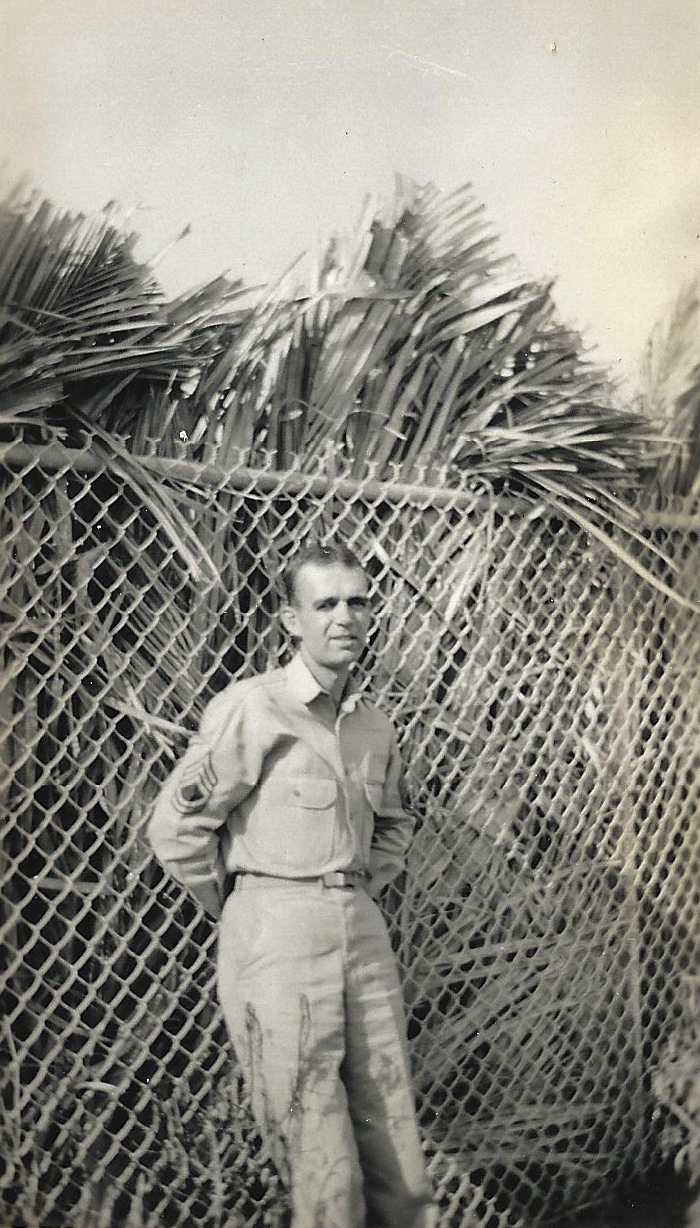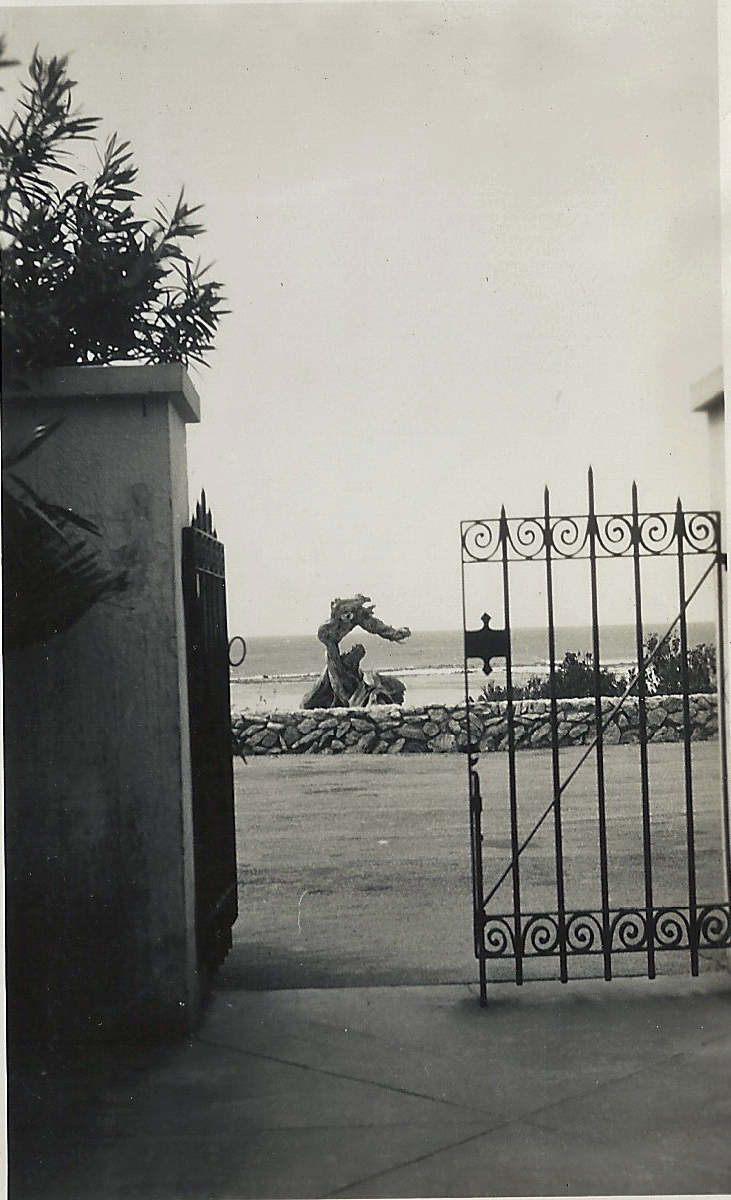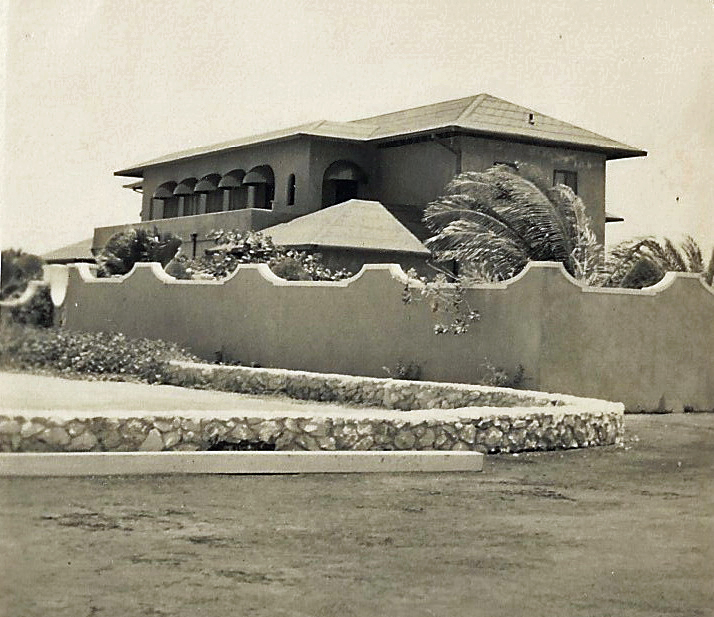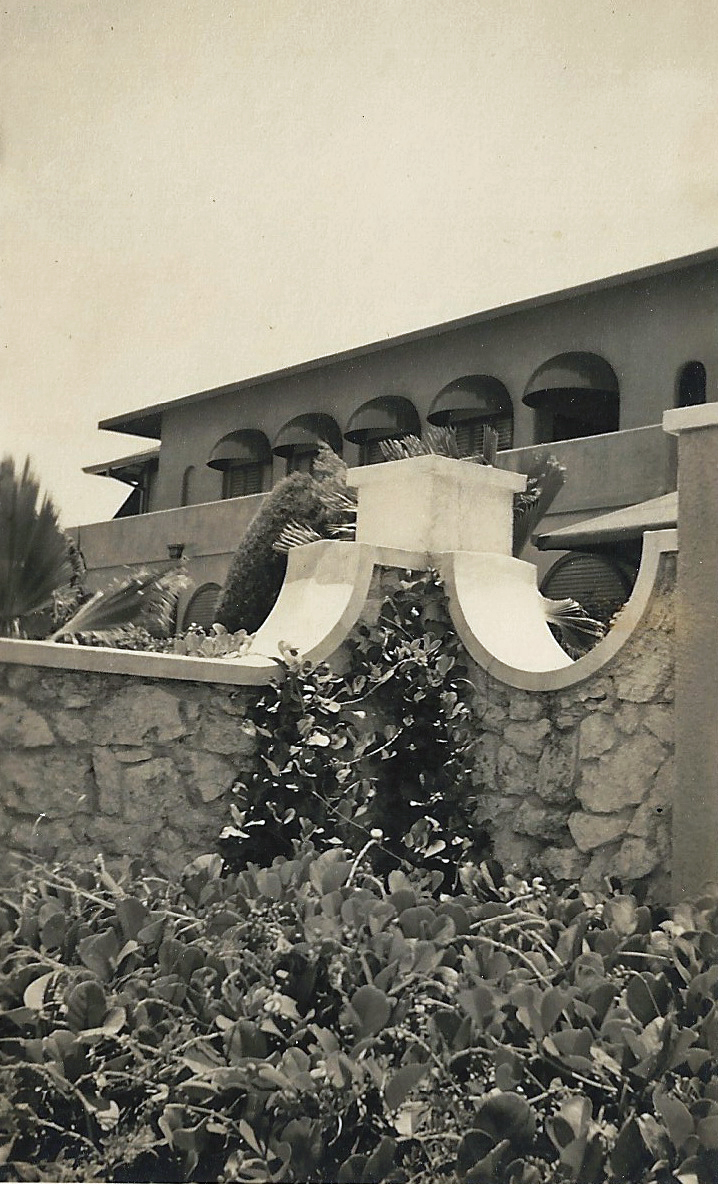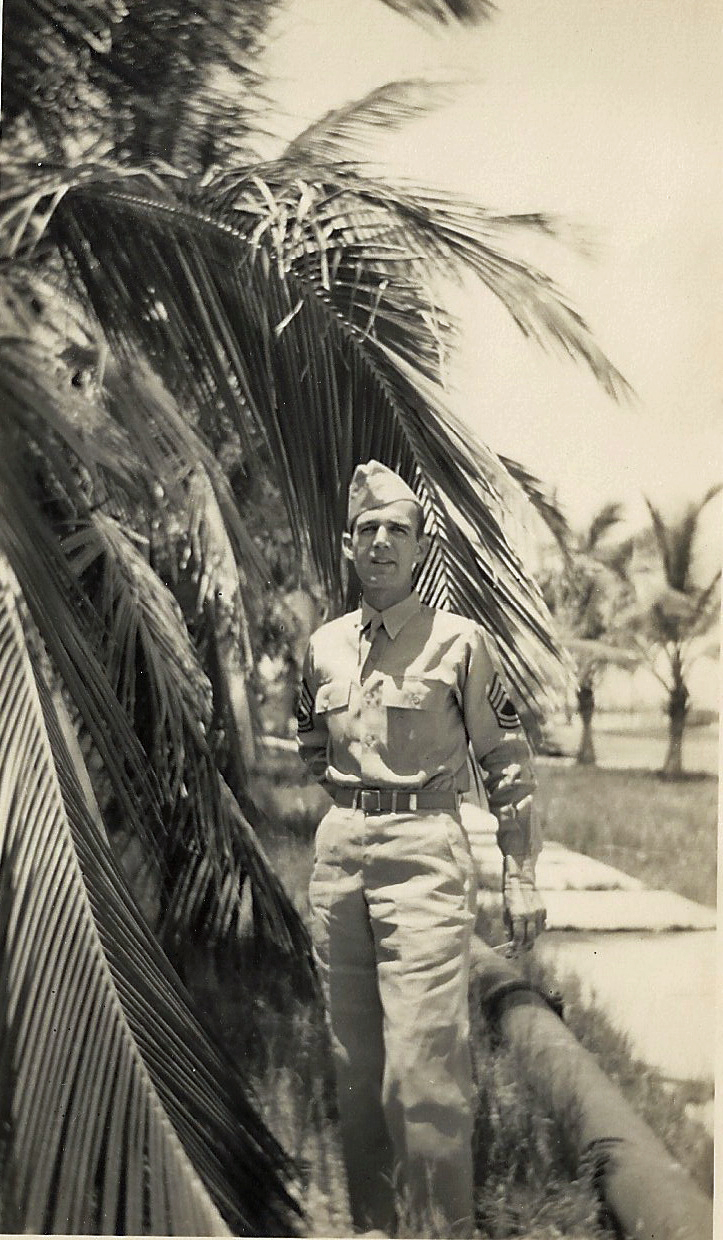PETER C. WARD
JOURNAL BY ARNOLD DOUGLAS WARD
Force 1280 embarked from New Orleans 4:00 pm Feb. 6, 1942 aboard the S.S. ATS “Florida”. This comes after 1 ½ months preparation and forming of the force – representing work night and day.
So much has happened that I am unable to remember everything in order to bring this up to date. The voyage was one great experience. Our naval escort of two destroyers – sometimes three and aircraft at times were ever present to clear our paths of mines and submarines. We experienced submarines scares at various times. At night all portholes closed tightly – ship is in complete blackout. No smoking on deck. The only thing out – the stars – always a balmy stiff breeze, phosphorus flicks in the water –and perhaps a flash signal from one of the destroyers. Spent many hours together with Top out on deck, peering into darkness for lights from the other ships and just peering in general.
Personages to be remembered – Mr. McCoy – the chief steward , Col. Miller, the troop commander –Mr. Saunders –our steward. Food excellent – as members of the first three grades, Top and I ate in the main dining room; officers on one side and men on the other. Sistrunk and Strange from Battery A were our table mates. Made up my mind to eat lightly and thus avoid possible seasickness, but soon found myself eating full course meals with no ill effects. As a whole, very little seasickness – trip smooth with exception of first and last days out. Flying fish in great schools usually seen during daytime.
Our headquarters was two adjoining staterooms – one for Top and me – Prigg. Carltestan and Barders in the other. Field desks, typewriters, files, etc…, all set up. Normal publications of orders etc… Reveille held out on deck 6:05
Aruba – our destination – sighted early morning of the 11th – a very faint outline on the horizon. Docked at San Nicolas at 7:30 AM. Scotch guards walking past on dock are colorful. Cocky berets or tanis – short trousers – slung rifles with bayonets, woolen socks up to knees with short strips of red ribbon hanging; perhaps end of garters.
Not able to debark until 2:30 PM the 12th. Scottish troops not ready to embark. Scottish troops were Fourth Battalion of the Queen’s Own Cameron Highlanders. Their officers came aboard – canes, monocles, white wool socks, dark blue felt highlander (overseas hats) with ribbons hanging –and all.
On the 12th – the Cameron officers “blossomed out” in their plaid kilts – several patterns of plaid represented. All very quaint and interesting to our new world eyes.
And finally we were off the ship – debarkation – loaded into right hand drive British trucks – and the driven to 2 ½ miles to Camp Savaneta.
Scottish troops ready for embarkation. Talked with their Sergeant Major – pointed out his quarters to me that I would inherit, and advised a Flit gun, and also setting legs of bed in cans of oil. He said the bugs were bad. Well, he was correct. The coil springs of the cots were completely filled with nests of bedbugs. Never have I been subjected to the damn things, but now I can say that I have really been exposed – slept on that cot one night, and next day till the number of the vermin running around loose. Thereafter, slept on canvas cot.
Back to debarkation. Highlanders formed on parade ground, with much clicking of heels and bellowing of commanders. The pipes and drums playing, they marched out of Camp Savaneta, perhaps forever – had been here for 18 months.
Even though they slept in lousy beds, they knew how to live and entertain. With their leaving, passed the social fling that there must have been, so I am told. Formal retreats, with a tea on terrace afterwards. The daily 4 o’clock tea, good liquor for the Sergeants in their own dining room - entertaining the Governor and the townspeople. The Camerons knew how to live.
The camp itself is built to suit the climate. Facing upon the blue Caribbean port not more than 200 yards from the shore. There is the Headquarters Canteen and adjoining post office and reading rooms facing on long canopied terrace, infirmary, officer's row of huts (so called by the Scotch) and the officer's club and mess. All roofs are metal, low overhanging and painted red which has faded to a fine old rose. The headquarters and canteen face on two sides of the parade ground. The enlisted man's barracks are located in rows on the other side of the parade ground of opposite the canteen. The fourth side left open to the sea. The enlisted men's barracks look much like sheep barns at the state fairgrounds and the latrines - well - they take me back to the crude barn floors that must have been used in the days of Pompeii. There are showers and two long sinks - but the stools just are merely holes in the cement floor - level with the floor - with sea water flushed through underneath at intervals to carry away the waste. The entire place is in filthy condition. We have sprayed disinfectant in all barracks and latrines and now this begins to have better appearance, and better odor. There is an ever present wind blowing - and consequently the sand finds its way into all barracks - covers beds, guns, and mess kits daily. The sand is coarse, having been formed from coral formations. Aruba is formed from lava from extinct volcanoes and the coral formations.
The Dutch Army is also here and are quartered in one quarter of our area. Both flags fly at the main entrance. Our guard house is located at the main gate. Our money has been mingled with the Dutch guilder already and is worth more in exchange - U.S. dollar worth 1.88 in Dutch.
We have had a bit of action already. Several tankers sunk by enemy submarines, the first happening at 1:30 AM the 14th, I believe. Call to Arms sounded - to find the entire port of San Nicolas in flames. Actually, a tanker had been torpedoed, spreading oil over water and was burning. The entire mass of burning fire moved out to sea and burned itself out. The excitement was terrific. Since then a submarine has appeared above water during daylight hours at Oranjstead - and another missed its mark of a tanker near there. A torpedo landed on beach, unexploded. The Dutch placed guard over it - several Dutch officers and enlisted - while attempting to remove explosives from it caused torpedo to explode, and killed several.
We have the remains of torpedo in camp now waiting for investigation of naval authorities. It is vicious looking thing - 18 ft long without the nose and powder charge - which was finally fully removed after it exploded. 3/4 of torpedo is full of batteries and mechanisms - fins and propeller on rear end - probable cost $8000.
San Nicolas also experienced incendiary flares night before last - possibly an attempt of submarine to illuminate the town for shelling. Entire island is and has been in blackout for past week. We are alerted from 5:00 AM to 7:00 AM and 6:00 PM to 8:00 PM at which time we man our posts, pill boxes and other vantage points in the camp area. This is Feb. 21st 8:00 PM and alert is over.
Sunday 22nd
Our usual morning alert - nothing of import other than one of our ships firing out to sea. Worked most of morning, arranging my orning reports of new units transferred in - to church on terrace overlooking sear. Here in office this PM - everybody gone.
March 12.
Time elapses quickly. One month today since we landed - one dead already Pvt. Cecil Hannah from Lucasville, Ohio, killed in the line of duty - shot by two unknown assailants while on Post #2 at Lago Oil Co. - shot in leg and died at hospital from loss of blood. Funeral held here in library terrace. Impressive, unique native hearse. Looked like station wagon, only not like one upon closer inspection. Doors and body were carved - after ceremony - or service (during which we sang, "Lead Kindly Light" with Lt. Drove field playing organ). 8 black plumes were mounted on top of hearse before departing for cemetery. Three volleys fired at grave.
IT SAYS HERE
by
The Editor
Taps for Private Hannah
Private Cecil Hannah was fatally shot while on guard duty as a sentry at Aruba. He died while on duty at a lonely post. The words are simple to say, but the act carries the thunder of revenge and the utmost in loyalty that a man can give. Private Hannah would not want a eulogy. He would more than likely appreciate having his life back long enough to know that he had not given his life in vain; long enough to see the victorious end of this war; long enough to know that those he loved back home can live in the peace and security they deserve. While Private Hannah cannot have his life back, there are plenty of us here to see that his desires are fulfilled in a silent pledge "to carry on" as Taps ring out over the Caribbean waters for our first comrade "over there".
Last Sunday - Cpl. Tiedge, Prigg, and I went with Jan Von Bork and Pete in Jan's Ford "Dive Bomber" - first to Oranjstead to take pictures and sightsee - then on to Eagle Beach to swim. Water fine.
Three Dutch boys, Pete, Nicholas Morgageau, Tony ......, came from Canada a few days ago to train the new Dutch conscripts. The boys are all three Corporals - much fun - We sit out on the Canteen terrace at night, looking at stare, talking, singing and trying to talk Dutch. Interesting fellows. They are rather daredevil - been in Dutch Army four years.
Yesterday was wonderful day. Letter from Mother and also from Renee. Renee sent me a medal. Small silver one of Saint Christopher, the patron saint of all voyagers. I appreciate it very much.
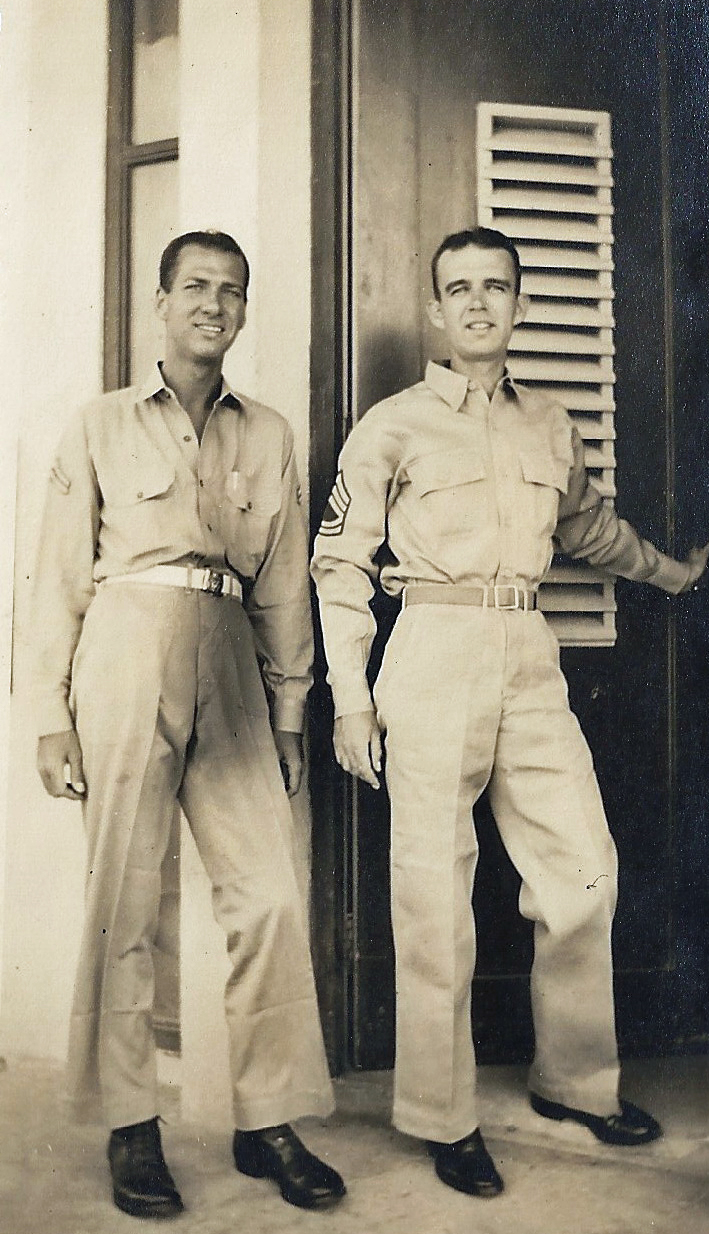
Cpl. Blair & Sgt. Ward
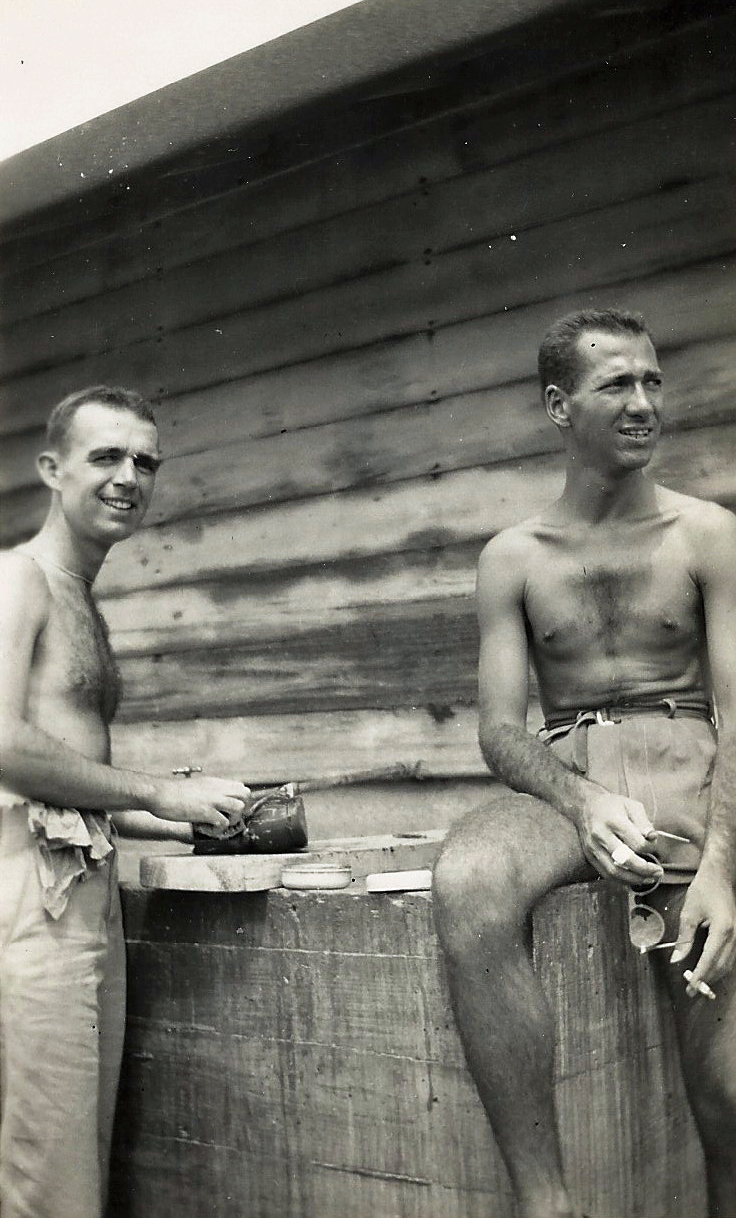
Arnold Ward and Blair
